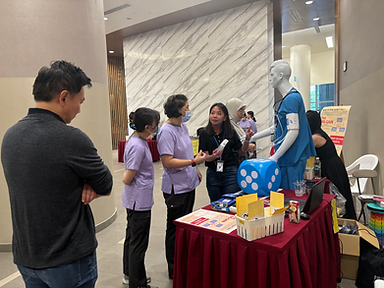JHC Patient Safety Day 2024: Emphasising Accurate Diagnosis for Safer Care

JHC Patient Safety Day 2024: Emphasising Accurate Diagnosis for Safer Care
This year's World Patient Safety Day event on 2 October 2024, themed "Get it Right, Make it Safe! – Improving Diagnosis for Patient Safety", gathered over 300 staff members from across departments at our Auditorium, aligning with the World Health Organization's (WHO) global focus. The event shone a spotlight on the crucial impact of accurate and timely diagnosis in promoting patient safety and enhancing health outcomes.

This year's World Patient Safety Day event on 2 October 2024, themed "Get it Right, Make it Safe! – Improving Diagnosis for Patient Safety", gathered over 300 staff members from across departments at our Auditorium, aligning with the World Health Organization's (WHO) global focus. The event shone a spotlight on the crucial impact of accurate and timely diagnosis in promoting patient safety and enhancing health outcomes.
A key part of the day was a talk led by Clin A/Prof Gerald on the vital role of precise diagnosis as the foundation for effective treatment, reinforcing our institution's dedication to learning from past events and continuously improving patient safety. By addressing diagnostic errors, we’re better positioned to prevent complications that often arise from misdiagnosis—a shared commitment across all healthcare roles.

Here are some key takeaways from Clin A/Prof Gerald’s insightful talk:
Challenges Contributing to Diagnostic Errors:
-
Complexity of diseases
-
Limitations in expertise
-
Testing constraints
-
Patient-specific factors
-
System-related issues
-
Human error
Key Insights:
-
Human error, often driven by cognitive biases, plays a significant role in misdiagnoses.
-
There is no simple solution to diagnostic errors, due to their complex nature.
Actions You Can Take:
-
Continuously expand your knowledge and clinical experience.
-
Hone your clinical reasoning and decision-making skills.
-
Collaborate with colleagues and seek guidance.
During the Q&A session, a thought-provoking question was raised: “What advice would you give if doctors don’t listen when nurses share their perspectives?” In response, Clin A/Prof Gerald introduced the CUSS communication tool (Concerned, Uncomfortable, Safety issue, Stop), designed to empower nurses to assertively voice their concerns. This tool is a critical resource for fostering direct, open communication and ensuring every team member feels equipped to advocate for patient safety.
C:
U:
S:
S:
I am Concerned
I am Uncomfortable
This is a Safety issue
Please Stop now

The event also honoured our Patient Safety Star Award recipients: Joey Loo Kai Chin (Nurse Clinician, ICU, NTFGH), Jessie Ngu Hung Ing (Senior Staff Nurse, ICU, NTFGH), and Tiong Cui Ling (Senior Staff Nurse, Nursing Admin). Their swift actions in identifying and escalating concerns about a patient’s condition after an arterial line insertion led to immediate intervention, ultimately improving the patient’s outcome. Their commitment to proactive patient care exemplifies the vigilance and dedication we value in our patient safety culture.
Congratulations!

From left: Tiong Cui Ling (Senior Staff Nurse, Nursing Admin, NTFGH), Jessie Ngu Hung Ing (Senior Staff Nurse, ICU, NTFGH), and Joey Loo Kai Chin (Nurse Clinician, ICU, NTFGH)

At the auditorium foyer, several activity booths brought the day’s theme to life, offering hands-on activities to deepen understanding of diagnostic accuracy and collaborative care. These stations emphasised the role of every team member in enhancing patient safety, making for a highly engaging experience.
Booth 1: Medication Safety Committee
The team focused on good prescribing practices, showcasing the 'Taper/Ramp' and 'Combination Dose' buttons, educating on accurate BGM entry, and raising awareness about the High Alert Medications (HAM) list.
It also highlighted the dangers of polypharmacy and demonstrated safe infusion pump usage.

Booth 2: Nursing Teaching & Development
The team engaged participants on critical patient care aspects, featuring a poster on the RARE framework (Recognise, Assess, Respond, and Escalate) and interactive games like “Whack It,” which included quizzes and prizes.


Booth 3: Nursing Informatics
The teams shared more on the VitalScout Project through informative posters, dice games, and live demonstrations of the devices.
Booth 4: Radiology
The team educated the staff on imaging techniques and safety, showcasing various modalities, sharing radiation safety protocols, and presenting common diagnostic errors along with new technologies through interactive activities.

This year’s World Patient Safety Day celebrated our ongoing journey to improve patient care through precise diagnosis and collaboration. By recognising our committed staff and sharing practical tools like CUSS, we’re reminded of the crucial role each one of us plays in advancing patient safety and health outcomes. Together, we can continue building a culture of safety and excellence across our organisation.
Check out more photos below!

























